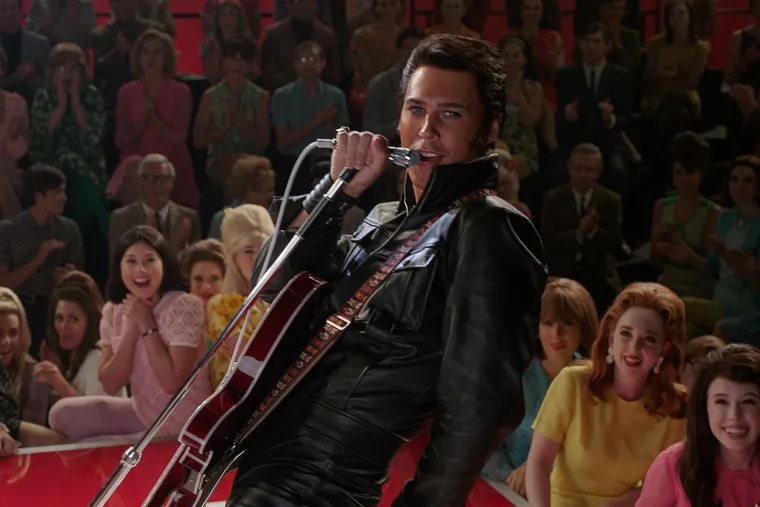“Elvis” fails to portray the full story of Elvis Presley
To many music aficionados, Elvis Presley carries the title “The King of Rock and Roll.” He has made waves with songs including “Can’t Help Falling in Love,” “Jailhouse Rock,” and “Suspicious Minds,” having 18 number-one hits. Director Baz Luhrmann guides audiences through the highs and lows of Presley’s career in his new movie “Elvis,” released on June 24, 2022.
Colonel Tom Parker, played by Tom Hanks, narrates “Elvis” and acts as the manipulative talent manager of Presley, portrayed by Austin Butler. Parker begins by describing Presley’s early life growing up in Memphis, Tennessee. Music surrounds Presley in Memphis, especially the gospel and blues sung by Black musicians. When Parker first sees Presley perform, Presley shocks and amazes the crowd with his dancing and vocals, landing himself on a tour with another musician. Presley then signs Parker to become his manager, forming Presley Enterprises. As Presley rises to stardom, he struggles with censorship and controversy around his supposed vulgar dancing, pressuring him to suppress his identity to act more family-friendly. “Elvis” also delves into Presley’s drug addiction while performing at the International Hotel in Las Vegas, along with the complex and toxic relationship between Presley and Parker that lasted until Presley’s death.
Austin Butler delivers a strikingly convincing performance as Presley with his exemplary talking, singing, and dancing. Throughout a grueling five-month-audition process, Butler meticulously studied Presley’s interviews and entire discography, putting his everything into this role. Butler’s hard work seemed to pay off since he successfully captured the way Presley spoke throughout the different stages of his life. Moreover, while Luhrmann used many of Presley’s real vocals throughout the film, he also utilized Butler’s own singing for some of Presley’s earlier hits, along with blending the vocals of Butler and Presley. Butler completely encapsulated Presley’s talent in his own renditions of “Trouble,” “Hound Dog,” and “Baby, Let’s Play House.” Not only did Butler replicate Presley’s voice, but he also nailed Presley’s iconic yet controversial dance moves like his leg shaking. Butler fully embraced Presley, throwing himself into the role to provide an incredible re-enactment of the star. While Butler’s performance stands out beautifully, Hanks also effectively captures Parker’s deceiving ways, seeming to truly care for Presley, but realistically only having his own best interest at heart. Parker’s manipulation of Presley remains evident throughout Hanks’ performance, which enhances the drama of the film.
In addition to the strong acting throughout “Elvis,” Cinematographer Mandy Walker makes the film more enjoyable to viewers through camera work. Walker uses duller black and white tones while shooting Presley’s early life, but as the setting moves to Las Vegas, she increases the color and vibrancy, demonstrating Presley’s growing fame and wild lifestyle. She also employs a moving camera throughout the film, allowing audiences to feel like they are a part of the action while watching various performances.
Although the acting and cinematography in “Elvis” are exceptional, the portrayal of Presley seems only to glorify him instead of bringing attention to some of his flaws. For example, Luhrmann portrays Presley’s relationship with the Black musicians in Memphis in a way that makes them seem supportive of his career. Yet, he fails to focus on those in Memphis who dislike Presley for profiting off of Black musician’s songs like Big Mama Thornton’s “Hound Dog” and Arthur Crudup’s “That’s Alright.” Luhrmann also puts little focus on the worrying ten-year age gap in Presley and Priscilla Presley’s relationship, seemingly ignoring the fact that when the couple first met, Priscilla was only fourteen. To ensure that only a positive light is shone on Presley, Luhrmann avoids many of Presley’s significant controversies, keeping his moral slate clean. While “Elvis” remains an overall enjoyable watch, concentrating on the good and bad aspects of Presley would have helped to humanize “The King” and add more realism to the film.

Michelle Bookbinder is a senior and an Editor-in-Chief. When Michelle's not writing, she can be found dancing, playing Sudoku, and listening to Yacht Rock...

